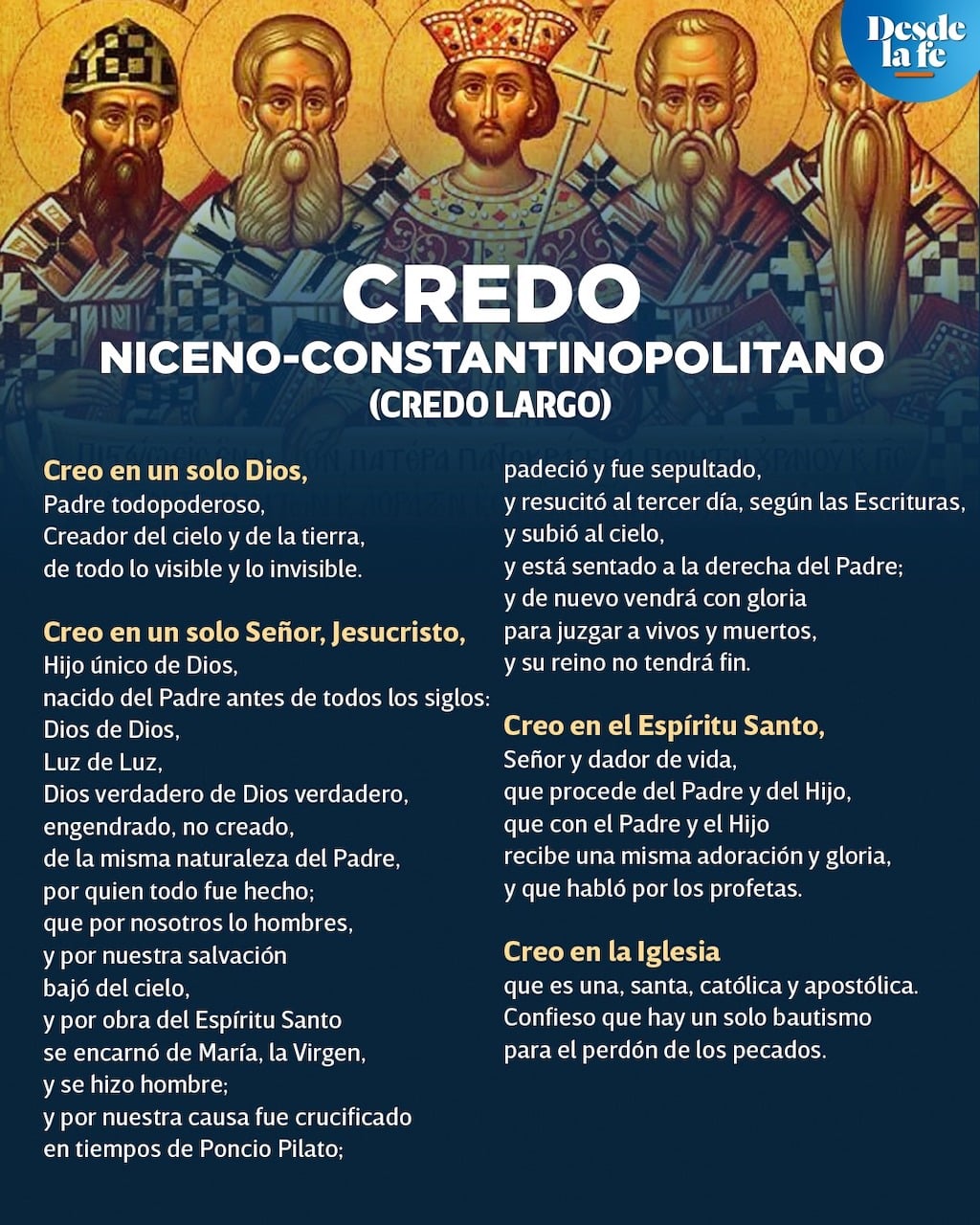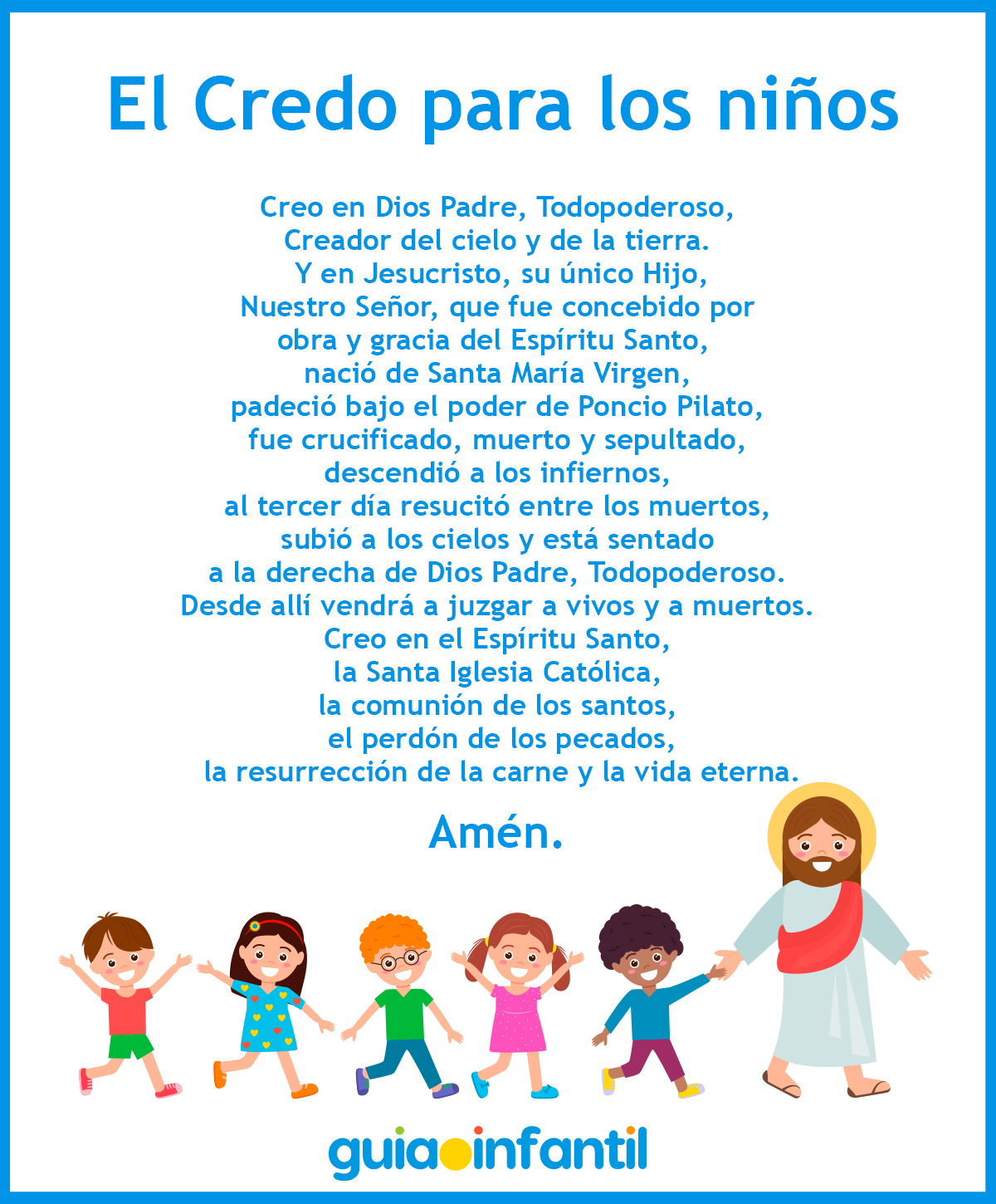There's a very special connection between what we believe deep down and how we talk with the divine, you know, through prayer. It's almost like our core beliefs, our "credo," form the very ground where our prayers, our "oracion," can truly take root and grow. This idea, that our fundamental convictions shape our spiritual conversations, is something worth exploring, and it really helps us see how our inner world links up with our outward expressions of faith.
For many people, the word "credo" carries a lot of weight, a bit like a foundational statement. It comes straight from the Latin word meaning "I believe," and it's been the starting point for many important religious statements, like the Apostles' Creed and the Nicene Creed. These aren't just old words; they are, in a way, summaries of what a community holds dear, a concise statement of doctrines formulated and accepted by a church, and that's pretty powerful.
Today, as we think about "credo la oracion," we're looking at more than just ancient texts. We're considering how a personal "credo"—a set of principles that guide a person or group—can really inform and enrich the act of prayer. It's about understanding how our deepest convictions, whether they are religious or moral, can actually shape our conversations with something bigger than ourselves, making our prayers, well, more meaningful and direct, you know?
- Where Is The Vice Presidents House
- Please Noah Kahan Lyrics
- Spongebob Golf
- Trader Images
- Tiny Homes Under 50k
Table of Contents
- What is a Credo, Really?
- Credo in the Heart of Worship
- Your Personal Credo: A Guiding Light
- The Profound Link: Credo and Oracion
- Why Having a Credo Matters for Prayer
- Living Your Credo Through Prayer
- Frequently Asked Questions About Credo and Prayer
What is a Credo, Really?
The word "credo," as we know, comes from Latin, meaning "I believe." It's actually the first word of many religious credos, or creeds, like the Apostles' Creed and the Nicene Creed. These are, in essence, formal declarations of religious or moral beliefs, summaries of what a church accepts as its core doctrines, and that's very important for understanding its roots.
Beyond its religious beginnings, the word "credo" has taken on a much broader meaning. It now refers to a fundamental statement or principle that shapes one's beliefs or actions. It's essentially a personal or group's philosophy or set of ideals that they live by, you know? So, it could be about anything that you really, truly believe in, guiding your steps every day.
For example, a company might have a credo about clean, nontoxic beauty products, fighting for rights, or even developing revolutionary diagnostic technologies. These are, in some respects, statements of their core beliefs and what they stand for. This wider sense of "credo" shows us that it's about more than just faith; it's about any system of principles that guides a person or a group, and that's pretty neat.
- Brooklyn And Bailey Wedding
- Miss Teschmacher
- Past Crossword Clue
- Mika Joe Scarborough
- Jordan Wiseley Movies And Tv Shows
Credo in the Heart of Worship
In Christian liturgy, the "credo" is a very specific part of the Mass. It's that portion where a creed is recited or sung, usually the Nicene Creed or the Apostles' Creed. This act is a powerful affirmation of what Catholics, for instance, believe about God, Jesus Christ, the Church, and life after death. It's a collective declaration, a shared understanding of faith, and that's quite moving.
This liturgical "credo" is often divided into parts, like "Creo en un solo Señor, Jesucristo" (I believe in one Lord, Jesus Christ). This recitation isn't just words; it's a communal act of faith, a moment where everyone present affirms their shared beliefs together. It's a very public and deeply personal expression all at once, you know, connecting individuals through a common statement of belief.
When we think about "credo la oracion," this liturgical context is key. The credo, in this setting, isn't just a statement; it's a foundational prayer in itself, preparing the heart and mind for further worship and personal prayer. It's a collective "I believe" that frames all subsequent individual "I ask" or "I thank," and that's pretty profound.
Your Personal Credo: A Guiding Light
Beyond formal religious settings, each of us, in a way, has a personal credo, whether we've written it down or not. It's that unwritten list of things we truly believe in, those principles that really guide our actions and decisions. This personal philosophy shapes how we see the world, how we interact with others, and how we approach our own lives, you know? It's like our inner compass.
This personal credo could be about anything: honesty, kindness, perseverance, or perhaps a commitment to justice. It's about what you stand for, what values you prioritize, and what you believe is right. These aren't just fleeting thoughts; they are, in some respects, the bedrock of your character, and that's something to really think about.
Having a clear personal credo can bring a lot of clarity to your life. It helps you make choices that align with your deepest convictions, and it gives you a sense of purpose. It’s like having a map for your journey, making sure you stay true to yourself, which is, honestly, a wonderful thing.
The Profound Link: Credo and Oracion
Now, let's really think about "credo la oracion"—the connection between your beliefs and your prayer life. Your credo, whether it's a formal religious creed or your own personal philosophy, acts as the framework for your prayers. What you believe about the divine, about yourself, and about the world, directly influences what you pray for, how you pray, and even why you pray, you know?
If your credo includes a belief in a loving, merciful higher power, your prayers might be filled with gratitude and trust. If your credo emphasizes justice and compassion, your prayers might often be for those who are discriminated against based on their race or religion, mirroring the spirit of organizations that fight for such rights. It's a very direct link between your inner convictions and your outward petitions, which is quite powerful.
A credo gives your oracion depth and direction. It’s not just random words; it's prayer rooted in conviction. When you pray from a place of clear belief, your words carry more weight, both for you and, arguably, in the spiritual sense. It's like having a solid foundation for a beautiful building, making sure everything stands strong, and that's really important.
Why Having a Credo Matters for Prayer
Having a well-defined credo helps bring consistency to your prayer life. It means your prayers aren't just spontaneous reactions to immediate needs, but rather, they flow from a consistent set of beliefs. This consistency can make your prayer practice feel more stable and meaningful over time, you know? It’s like having a steady rhythm.
A credo also provides a lens through which you interpret your experiences and your prayers. When challenges arise, your core beliefs can guide your prayers for strength, wisdom, or understanding. It helps you frame your requests and expressions of gratitude within a larger spiritual context, which is, honestly, a comforting thought.
Furthermore, a shared credo, like the Apostles' Creed, fosters a sense of community in prayer. When many people recite the same creed, they are affirming their shared beliefs together, creating a powerful collective prayer. This unity in belief can deepen the spiritual experience for everyone involved, and that's something truly special to witness, you know?
Living Your Credo Through Prayer
To truly live your credo through oracion means aligning your daily actions and your prayer life. If your credo is about compassion, your prayers might include asking for opportunities to show kindness and for the strength to act on those feelings. It’s about making your beliefs active, not just passive thoughts, and that's very much a dynamic process.
Prayer can also be a way to reinforce your credo. Through consistent communication with the divine, you can strengthen your beliefs and deepen your commitment to the principles you hold dear. It's a two-way street, where your credo informs your prayer, and your prayer, in turn, strengthens your credo, you know? It's a beautiful cycle.
So, as you go about your day, consider what your personal credo truly is. Think about how those core beliefs can shape your conversations with the divine, making your "oracion" a true reflection of your "credo." It's a powerful way to live a life that is, in a way, deeply connected to your innermost convictions. Learn more about credo on our site, and link to this page here for more information.
Frequently Asked Questions About Credo and Prayer
What is the basic meaning of "credo"?
Basically, "credo" comes from Latin and means "I believe." It refers to a fundamental statement or principle that shapes one's beliefs or actions, a bit like a personal philosophy. It's the starting point for many religious creeds, such as the Apostles' Creed and the Nicene Creed, you know, showing its deep roots.
How does a credo relate to prayer or "oracion"?
A credo acts as the foundation for your prayer. What you believe, your credo, directly influences what you pray for, how you pray, and the very spirit of your "oracion." It provides the framework and the guiding principles for your conversations with the divine, making your prayers more focused and meaningful, you know?
Is "credo la oracion" only for religious people?
While "credo" has strong religious origins and is a key part of Christian liturgy, the idea of a personal credo—a set of guiding principles—applies to anyone. So, even if your "oracion" isn't a formal religious prayer, your core beliefs still shape how you reflect, meditate, or simply connect with your inner self or the world around you, which is, honestly, a very human experience.
- Miley Cyrus New Photos
- Kamala Harris You Are At The Wrong Rally
- Mark Ruffalo Politics
- Engagement Ring Royal
- Vanna White Says Goodbye To Pat Sajak


